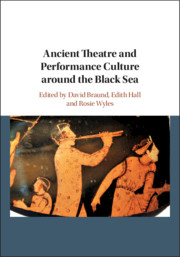Book contents
- Ancient Theatre and Performance Culture around the Black Sea
- Frontispiece
- Ancient Theatre and Performance Culture around the Black Sea
- Copyright page
- Contents
- Figures
- Notes on Contributors
- Preface
- Abbreviations
- Map
- Part I Approaches
- Part II Places
- Part III Plays
- Part IV Performative Presences
- 16 Music and Performance among Greeks and Scythians
- 17 A New Mask and Musical Instruments from the Eastern Bosporus
- 18 The Cult of Dionysus in Ancient Georgia
- 19 Paratheatrical Performances in the Bosporan Kingdom
- 20 Historiography and Theatre: The Tragedy of Scythian King Skyles
- 21 Life Trajectories: Iphigenia, Helen and Achilles on the Black Sea
- Epilogue: Dancing around the Black Sea: Xenophon, Pseudo-Scymnus and Lucian’s Bacchants
- References
- Black Sea Index
20 - Historiography and Theatre: The Tragedy of Scythian King Skyles
from Part IV - Performative Presences
Published online by Cambridge University Press: 12 November 2019
- Ancient Theatre and Performance Culture around the Black Sea
- Frontispiece
- Ancient Theatre and Performance Culture around the Black Sea
- Copyright page
- Contents
- Figures
- Notes on Contributors
- Preface
- Abbreviations
- Map
- Part I Approaches
- Part II Places
- Part III Plays
- Part IV Performative Presences
- 16 Music and Performance among Greeks and Scythians
- 17 A New Mask and Musical Instruments from the Eastern Bosporus
- 18 The Cult of Dionysus in Ancient Georgia
- 19 Paratheatrical Performances in the Bosporan Kingdom
- 20 Historiography and Theatre: The Tragedy of Scythian King Skyles
- 21 Life Trajectories: Iphigenia, Helen and Achilles on the Black Sea
- Epilogue: Dancing around the Black Sea: Xenophon, Pseudo-Scymnus and Lucian’s Bacchants
- References
- Black Sea Index
Summary
The purpose of this chapter is primarily to examine storytelling at Olbia (alias Borysthenes), with particular regard to the theatrical evocations of the tale of Skyles in Herodotus’ Histories (4. 76–80). The fact that Herodotus saw fit to set out his demise in such detail, and thereby gave it so much space in his text, requires that we pay it special attention in any case. All the more so, when we observe that this lengthy vignette dominates the shift in his text from surveying Scythian culture(s) to the campaign of Darius, which opened Book 4 and which would soon once again become the focus of his account. Skyles’ story is all the more interesting for us (and doubtless for Herodotus), because – as we shall see – he was a real individual, however much we may consider his tale to be fictional or suitable for fictional treatment. Moreover, he lived at a time that can be no more than a few decades before Herodotus visited Olbia and wrote about his story in the Histories. These considerations sharpen the question of the interaction between history, storytelling and theatre at Olbia and elsewhere. We happen to know that dramas about real and recent individuals were staged elsewhere in the Black Sea and beyond, so that Skyles’ case may be located in a broader tendency in drama and historical writing. After all it has long been understood that there was in antiquity an important interaction between these two kinds of literature. At the same time, there has also been important discussion of the interplay between drama and Herodotus’ historical writing, for which Athens has been the usual context. In this chapter, it is Olbia that most concens us, albeit with strong links to Athens and its theatre culture. For it is especially the potential place of Skyles in the theatre culture of Olbia that most matters here. What can Herodotus’ report of the Olbian tale of Skyles contribute to our understanding of drama in Olbia itself? Fundamental to that large question, however, is the more specific issue of the nature, and especially the limitations, of Herodotus’ concern to write about Olbia at all.
- Type
- Chapter
- Information
- Ancient Theatre and Performance Culture Around the Black Sea , pp. 433 - 452Publisher: Cambridge University PressPrint publication year: 2019



